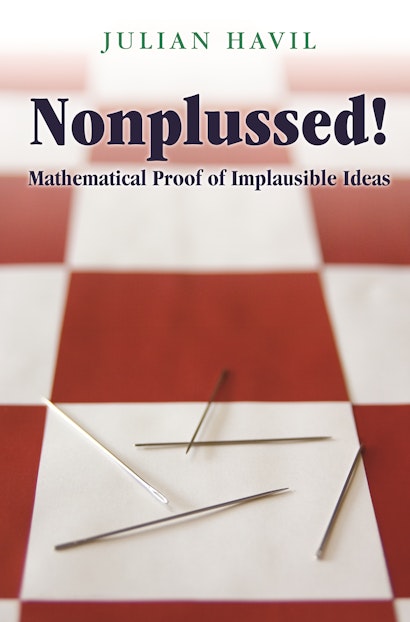Math—the application of reasonable logic to reasonable assumptions—usually produces reasonable results. But sometimes math generates astonishing paradoxes—conclusions that seem completely unreasonable or just plain impossible but that are nevertheless demonstrably true. Did you know that a losing sports team can become a winning one by adding worse players than its opponents? Or that the thirteenth of the month is more likely to be a Friday than any other day? Or that cones can roll unaided uphill? In Nonplussed!—a delightfully eclectic collection of paradoxes from many different areas of math—popular-math writer Julian Havil reveals the math that shows the truth of these and many other unbelievable ideas.
Nonplussed! pays special attention to problems from probability and statistics, areas where intuition can easily be wrong. These problems include the vagaries of tennis scoring, what can be deduced from tossing a needle, and disadvantageous games that form winning combinations. Other chapters address everything from the historically important Torricelli’s Trumpet to the mind-warping implications of objects that live on high dimensions. Readers learn about the colorful history and people associated with many of these problems in addition to their mathematical proofs.
Nonplussed! will appeal to anyone with a calculus background who enjoys popular math books or puzzles.
"Nonplussed! is a collection of lovely paradoxes: facts that are provable logically but are nevertheless seriously counterintuitive...It is an exciting book. It should be in every...college library. It would even be the right gift for mathematicians and anyone who uses mathematics—economists, business analysts and many others—and indeed for anyone who would claim to be educated."—Peter M. Neumann, Times Higher Education Supplement
"This is a splendid collection of articles, inspired by Martin Gardner's writings. Old conundrums are given new twists and applications, newer perplexing ideas are described with panache. The forthcoming companion book has a high standard to maintain."—John Haigh, London Mathematical Society Newsletter
"It is therefore recommended that Julian Havil's headmaster award him further sabbatical leave for the purpose of producing a sequel to this welcome addition to the mathematical literature."—Peter Ruane, MAA Review
"A review of a book as good as this must either repeat the positive adjectives other reviewers have used, or require a very large thesaurus. Since I find myself in complete agreement with all of the following words from other reviews, I will repeat them immediately: marvelous, crystal-clear, great, amazing, stimulating, delightful, fascinating, strong, surprising, classic, interesting, eclectic, insightful, magnificent. That one book could encourage such gushing praise seems as unlikely as one book being able to cram in a great variety and depth of mathematical problems, colourful historical anecdotes, significant nods to ethno-mathematics, difficult but well-explained proofs, clear and engaging prose and beautiful diagrams. Yet Havil's book succeeds on all accounts...The brilliant writing, the wonderful problems, the weaving together of past and future, games and discovery, and world number cultures will have you returning to this ageless book time and again."—Phil Wilson, Plus Magazine
"This fascinating expedition by Havil through some engaging and often surprising mathematical and statistical oddities is more demanding than the usual 'popular math book' it is billed...All topics are covered by an always carefully crafted mathematical exposition, not leaving out necessary preliminaries and providing rigorous proofs."—J. Mayer, Choice
"Even many high school students without a calculus background will benefit from the problems contained in the book. . . . The book contains a little algebra, some geometry, and a great deal of probability. It could serve as recreational reading for teachers as well as for student use in a probability course or courses following algebra 2. Mathematics clubs and teams would also find Nonplussed! useful."—Paul Kelley, Mathematics Teacher
"This is a fun book containing many diverse problems that I had not seen before but it also stimulates some genuinely interesting mathematical thought. Above all, this book highlights the 'frailty of the intuition we routinely use to guide us through our everyday lives' and that, in my mind, is no bad thing."—Nathan Green, Mathematics Today
"I recommend the book to everyone interested in entertaining mathematics."—Christina Birkenhake, Mathematical Intelligencer
"This book discusses such problems in a generally accessible way, but it does not shy away from using rigorous mathematical arguments to explain them. . . . Some of these topics are quite familiar, but even so I found the discussions clear and often learned some new and quite surprising tidbits."—Stan Wagon, Mathematical Reviews
"Those that spend their working lives avoiding mathematics by approaching their problems in all sorts of different ways will benefit from looking at this text, even if it involves following through but one single problem and its mathematical solution."—C.J.H. Mann, Kybernetes
"The book is perfect for independent or group study for students in advanced high school mathematics classes or university-level undergraduate mathematics classes. Selected chapters are suitable for discussion during professional development sessions aimed at engaging mathematics teachers in rigorous mathematics investigations and discussions."—Anne Papakonstantinou, Mathematics Teacher
"This lovely book will attract the attention of readers who are interested in recreational mathematics like mathematical puzzles and paradoxes."—Yuri V. Rogovchenko, Zentralblatt MATH
"Havil has an excellent mix of an interesting history of each topic and clear and lucid solutions to the problems. . . . Havil's strength is the historical background he gives to each topic and his style of writing which is so easy to read. . . . An interesting and challenging book well worth reading."—John Sykes, Mathematics in School
"Nonplussed!, as the title suggests, is a marvelous study of some two dozen choice mathematical problems that boggle the mind. Unlike so many books on recreational math, Havil doesn't hesitate to give crystal-clear proofs and their necessary equations. John Conway's great checker-jumping puzzle is here, along with amazing nontransitive betting paradoxes and other confounding results almost impossible to believe. No one interested in recreational mathematics on an intermediate advanced level should pass up this stimulating, delightful volume."—Martin Gardner
"In Nonplussed!, his new book of fascinating discussions of mathematical questions, Julian Havil's literary signature is evident even without seeing his name on the cover. The presentation always displays his strong ability to weave together the historical with what is often a surprising mathematical twist, even for those problems that have been around long enough to be called classic. Nonplussed! will be a classic, too."—Paul J. Nahin, author of Dr. Euler's Fabulous Formula
"Nonplussed!! is a very interesting and eclectic mix of paradoxes that has the potential to be a very useful and lasting contribution to popular mathematics."—Christopher J. Sangwin, author of Mathematics Galore
"I greatly enjoyed this book and I imagine that anyone who liked high school math will too. Nonplussed! certainly succeeds in surprising-and in giving insightful proofs of the mathematical results discussed. It is a magnificent demonstration of how far even rather straightforward mathematics can take you. And by describing many of the historical characters involved and the problems that motivated them, it makes mathematics seem like an adventure."—Nick Huggett, author of Space from Zeno to Einstein


